Skulls Unlimited processes thousands of skulls yearly for hunters, professionals, and educators.
Learn more!

Oct 25, 2006
Greg Horton, Oklahoma Gazette
Jay Villemarette started collecting skulls when he was 7 years old. He found a dog skull and brought it home. Soon after that discovery, he found a cat skull. Intrigued by the similarities and differences, he began to bring bones home whenever he found them.
“Like any good father, my dad encouraged my interest,” Villemarette said. “My dad saw a sincere interest, and he saw that the skulls inspired me to research the animals in field journals or encyclopedias.”
Since the skulls still had tissue attached, Villemarette had to experiment with different ways of stripping them down. He tried lye, boiling, burning and rotting. None of the procedures were as effective as another method he had read about and eventually utilized: dermestid beetles.
Dermestid beetles are indigenous to the United States, as well as most other places, and play an important role in the food chain.
“Once the maggots have blown a carcass open, the dermestid beetles come in and finish it up,” Villemarette explained. “They are carrion eaters, so when you find a carcass that has been dried to the point it feels like leather, if you turn it over, you’ll find the beetles.”
Villemarette collected his first colony of beetles under the carcass of a dead cow. “There are 850 varieties of dermestid beetle, but we only use one here,” he said.
“Here” is Skulls Unlimited International, an Oklahoma City business that Villemarette founded in his house in June of 1986. Skulls Unlimited is, according to the company’s Web site, the “world’s leading supplier of osteological specimens.” It supplies skulls and skeletons that have been stripped clean and sanitized to educational institutions, research facilities, museums and individuals. Educational facilities, including museums, are its largest customer.
Villemarette graduated from Moore High School in 1984 and became an auto body mechanic. The oil boom busted soon thereafter, and he found himself unemployed. He decided to parlay his skull hobby into a business and founded Skulls Unlimited.
The startup company in his home included the boiling of skulls on the family’s stove, a necessity that did not thrill his new wife.
“She used to tease me that she couldn’t tell her friends what her husband did for a living,” Villemarette said. “It’s been 14 years since she had to work, so she’s not complaining.”
The company grew steadily and moved to its current location at 10313 S. Sunnylane in 2000. It now has two buildings, employs 14 people including Villemarette, and has attracted the attention of the Discovery Channel’s “Dirty Jobs” with Mike Rowe.
An individual familiar with the company posted an entry on the Discovery Channel’s forums page recommending Skulls Unlimited for a “Dirty Jobs” segment. The original post is still out there. It reads in part: “A couple of years ago, I got to tour Skulls Unlimited in Oklahoma City. … It is (definitely) a dirty, smelly, disgusting job, particularly in the maggot room. … It has the gross-out factor, but it (is) totally science!”
Villemarette said the show was filmed the same week the company received a gray whale skeleton from the East Coast. The program featured the employees unloading the whale’s bones, including a jawbone that was so large three men had to carry it. The program also was kicked back twice for editing, as the Discovery Channel decided the material was too gruesome for television.
The processing center does pose challenges for people with weak stomachs or sensitive noses. The smell is palpable, a living thing almost, three-dimensional in its intensity. The bug room, which features 30- and 40-gallon aquariums full of dermestid beetles, smells just like you would expect an enclosed room with dozens of rotting carcasses to smell like.
Partially decayed body parts, including severed animal heads, are spread on the floor to wait their turn in the bug room. Trays of animal skeletons, a rolling cart full of human skulls (imported legally from China), elephant skulls, gray whale skeletons, and a ban saw to cut bone fill one side of the processing center.
Most of the employees say they no longer notice the smell. “You actually picked a good day to be here,” Villemarette said. He moved a severed zebu head and the odor emanating from the animal made him wince. “I stirred something up that time,” he said.
Villemarette is proud of the company he’s built, and he speaks animatedly of the next phase of his operation: a 12,000-square-foot museum next to the gift shop that will be open to local groups and feature gray whale, giraffe, hippopotamus and elephant skeletons, among other common and exotic animals.
“This part of the operation won’t be about money; you don’t make money with a small museum on the south side of Oklahoma City,” he said. “I just want to give something back to the community.”

Leave a comment